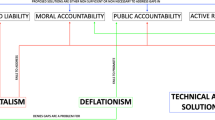Abstract
Computerized models of human cognition and behavior have been used to help researchers refine their theories of cognitive processes. Two difficulties inherent in using these cognitive models are that building representations of to-be-modeled groups or individuals is (1) time-consuming and (2) prone to error when performed manually. The use of computerized tools to build representations for cognitive models could alleviate these problems. Such a set of tools has been developed and applied to the task of modeling individual aviation pilots performing flight maneuvers in real time. A study conducted with 27 pilots confirms the accuracy of the computer-generated representations.
Similar content being viewed by others
References
Anderson, J. R., Bothell, D., Byrne, M., Douglass, S., Lebiere, C., & Qin, Y. (2004). An integrated theory of the mind. Psychological Review, 111, 1036–1060.
Byrne, M. D. (2003). Cognitive architecture. In J. Jacko & A. Sears (Eds.), The human-computer interaction handbook: Fundamentals, evolving technologies, and emerging applications (pp. 95–114). Hillsdale, NJ: Erlbaum.
Doane, S. M., & Sohn, Y. W. (2000). ADAPT: A predictive cognitive model of user visual attention and action planning. User Modeling & User Adapted Interaction, 10, 1–45.
Durso, F. T., & Gronlund, S. D. (1999). Situation awareness. In F. T. Durso, R. Nickerson, R. Schvaneveldt, S. Dumais, S. Lindsay, & M. Chi (Eds.), The handbook of applied cognition (pp. 283–314). New York: Wiley.
Gray, W. D. (2007). Integrated models of cognitive systems. New York: Oxford University Press.
Jodlowski, M. T., Carruth, D. W., Lowe, D., & Doane, S. M. (2003, May). Knowledge scoring engine (KSE) for real-time knowledge base generation. In Proceedings of the 12th Conference on Behavior Representation in Modeling and Simulation (pp. 435–437). Scottsdale, AZ.
Kintsch, W. (1988). The use of knowledge in discourse processing: A construction-integration model. Psychological Review, 95, 163–182.
Kintsch, W. (1998). Comprehension: A paradigm for cognition. New York: Cambridge University Press.
Mannes, S. M., & Kintsch, W. (1991). Routine computing tasks: Planning as understanding. Cognitive Science, 15, 305–342.
Newell, A. (1990). Unified theories of cognition. Cambridge, MA: Harvard University Press.
Rosenbloom, P. S., Laird, J. E., Newell, A., & McCarl, R. (2002). A preliminary analysis of the SOAR architecture as a basis for general intelligence. Artificial Intelligence, 47, 289–325.
Sohn, Y. W., & Doane, S. M. (2002). Evaluating comprehension-based user models: Predicting individual user planning and action. User Modeling & User Adapted Interaction, 12, 171–205.
Sohn, Y. W., & Doane, S. M. (2003). Roles of working memory capacity and long-term working memory skill in complex task performance. Memory & Cognition, 31, 458–466.
Author information
Authors and Affiliations
Corresponding author
Rights and permissions
About this article
Cite this article
Brou, R.J., Doane, S.M. & Bradshaw, G.L. Real-time generation of representations for cognitive models. Behavior Research Methods 41, 633–638 (2009). https://doi.org/10.3758/BRM.41.3.633
Received:
Accepted:
Published:
Issue Date:
DOI: https://doi.org/10.3758/BRM.41.3.633




